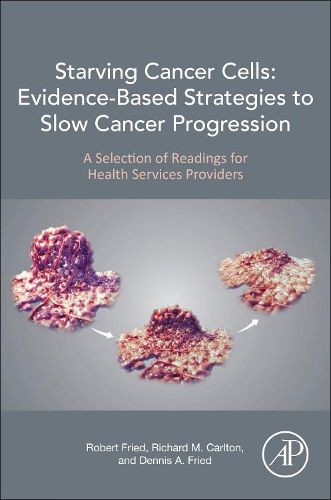Readings Newsletter
Become a Readings Member to make your shopping experience even easier.
Sign in or sign up for free!
You’re not far away from qualifying for FREE standard shipping within Australia
You’ve qualified for FREE standard shipping within Australia
The cart is loading…






Starving Cancer Cells: Evidence-Based Strategies to Slow Cancer Progression - A Selection of Readings for Health Services Providers presents an edited and annotated collection of recent medical journal publications and abstracts illustrating new approaches to treatment derived from the metabolic theory of cancer. It intends to shed an early light on a relatively new approach to our understanding of the cancer cell idiosyncratic metabolic dysfunction, and on evidence-based new treatment strategies derived from that understanding.
The book discusses topics such as tumor starvation by L-arginine deprivation; L-canavanine depriving tumors of L-arginine in pancreatic, multiple myeloma and breast cancer; glucose deprivation and intermittent fasting; glutamine uptake in cancer; the relation of oxygen-starved cancer cells with aspartate; and reducing tolerance of tumor cells to nutrition starvation. The content is presented in a contextualized and practical way in order to facilitate the transition from bench to bedside.
This is a valuable resource for practitioners, oncologists and other members of healthcare chain who are interested in learning more about the most recent tumor cell starvation strategies and how they can improve overall treatment outcome.
$9.00 standard shipping within Australia
FREE standard shipping within Australia for orders over $100.00
Express & International shipping calculated at checkout
Starving Cancer Cells: Evidence-Based Strategies to Slow Cancer Progression - A Selection of Readings for Health Services Providers presents an edited and annotated collection of recent medical journal publications and abstracts illustrating new approaches to treatment derived from the metabolic theory of cancer. It intends to shed an early light on a relatively new approach to our understanding of the cancer cell idiosyncratic metabolic dysfunction, and on evidence-based new treatment strategies derived from that understanding.
The book discusses topics such as tumor starvation by L-arginine deprivation; L-canavanine depriving tumors of L-arginine in pancreatic, multiple myeloma and breast cancer; glucose deprivation and intermittent fasting; glutamine uptake in cancer; the relation of oxygen-starved cancer cells with aspartate; and reducing tolerance of tumor cells to nutrition starvation. The content is presented in a contextualized and practical way in order to facilitate the transition from bench to bedside.
This is a valuable resource for practitioners, oncologists and other members of healthcare chain who are interested in learning more about the most recent tumor cell starvation strategies and how they can improve overall treatment outcome.